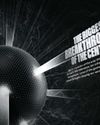
THE METAVERSE
If you don't know what the metaverse is (no judgment because it was horribly sold), it was a word that Mark Zuckerberg and roughly four other people used to describe loosely connected immersive technologies such as virtual reality (VR), augmented reality (AR), open-world gaming, digital avatars and nonfungible tokens (NFTs). The internet 3.0, if you will.
Zuckerberg imagined a terribly animated dystopia where we could work and socialise on a hybrid plane of semi-digital existence. We would have avatars to attend meetings for us, but for some reason, they wouldn't have legs. You could buy a mansion made of pixels, not bricks. Pop-up notifications would bombard our retinas via AR glasses that superimposed online content over the real world. And thanks to VR, we could do anything or go anywhere simply by strapping a heavy, sweat-inducing computer to our faces.
Some of these technologies are still fighting for life, but many have faded from relevance or completely stalled.
Zuckerberg's VR branch has now lost a staggering $58bn (£46bn) since 2020. Don't expect those losses to be a blip - a survey of 624 tech experts found that nearly half believe the metaverse won't play a major role in our lives, even by 2040.
HYPERLOOP
From an engineering perspective, hyperloop is a bold, world-changing form of transport - if only someone could get it to work. The idea is to encase people and cargo in a steel tube, then propel them with magnets through a near-vacuum at 1,000km/h (about 600mph), hopefully without rearranging anyone's internal organs.
Denne historien er fra January 2025-utgaven av BBC Science Focus.
Start din 7-dagers gratis prøveperiode på Magzter GOLD for å få tilgang til tusenvis av utvalgte premiumhistorier og 9000+ magasiner og aviser.
Allerede abonnent ? Logg på
Denne historien er fra January 2025-utgaven av BBC Science Focus.
Start din 7-dagers gratis prøveperiode på Magzter GOLD for å få tilgang til tusenvis av utvalgte premiumhistorier og 9000+ magasiner og aviser.
Allerede abonnent? Logg på

THE WORST IDEAS OF THE 21ST CENTURY
NOT ALL IDEAS CAN BE HITS. ALONGSIDE GROUND-BREAKING INNOVATIONS, 21ST-CENTURY SCIENTISTS HAVE HELMED THEIR SHARE OF WILD TECH FLOPS, DUBIOUS THEORIES AND OVERHYPED BREAKTHROUGHS. HERE ARE THE BIGGEST TO FORGET

10 IDEAS THAT WILL SHAPE YOUR NEXT 25 YEARS
Predicting the future is considered a fool's game. But it's one many of us like to play.

THE BIGGEST BREAKTHROUGHS OF THE CENTURY
We're a quarter of the way into the new century. To mark this milestone, we asked the UK's top minds to highlight some of the game-changing scientific breakthroughs shaping our world since the year 2000

DO THE SCIENCE COGNITIVE SHUFFLE
Trouble sleeping? A lot on your mind? Use this trick and sedate your synapses

WHAT DETERMINES HOW MANY ABS I CAN GET?
Assuming you're a human being, you have exactly the same number of abs as everybody else: two.

HOW CAN I IDENTIFY MY PSYCHOLOGICAL BLIND SPOT?
In the 1950s two American psychologists, Joseph Luft and Harrington Ingham, proposed a way of thinking about psychological blind spots - things you don't know about yourself - that they called the 'Johari Window' (the term is a combination of their first names).

How can I change my personality?
Want to become more confident, extroverted or assertive? Science shows that with a few simple changes, you can unlock your best self

Could your cosmetics be harming your health?
Cosmetic companies are phasing out microplastics and so-called 'forever chemicals' to help protect consumers.

extraterrestrial US Congress is talking about activity again. Is the truth really out there?
Despite several testimonies, the question remains frustratingly unanswered

Map of 100 million human body cells revealed
Over three dozen new studies mark significant milestone towards complete Human Cell Atlas